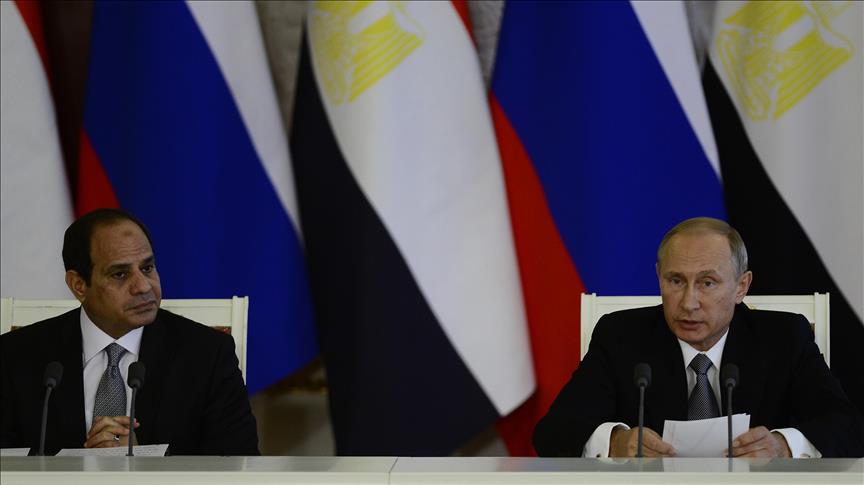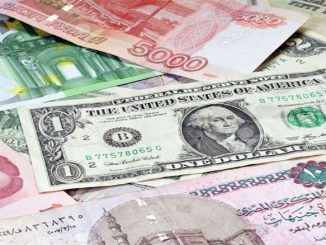
It seems that Egypt has not yet crystallized a decisive attitude towards the Russian-Ukrainian crisis, for fear that such a stance might later affect its relationship with any of the international powers involved in the crisis, reported the London-based Al Araby Al Jadeed
On Thursday, the Egyptian Foreign Ministry contented itself with calling for “predominance of the language of dialogue, diplomatic solutions and endeavors that would speed up the political settlement of the crisis in a way that would ensure preservation of international security and stability, and avoid escalation or deterioration of the situation or aggravation of the humanitarian and economic situation and the impact of this both regionally and globally.
Instructions for impartial media coverage
Several press sources from within the United Group for Media Services, affiliated with the Egyptian General Intelligence Service (GIS), which owns most of the media outlets in Egypt, confirmed that instructions were issued by GIS to chief editors and officials of newspapers, sites and channels, to act impartially towards the Russian invasion of Ukraine, not adopting the position of either side.
A former Egyptian diplomatic source commented on this situation, saying that “the Egyptian media’s handling of the crisis reflects the official cautious stance on what is going on, as the Egyptian government, which considers Russia a strategic ally, does not want to adopt the position of NATO, led by the United States, Egypt’s also strategic ally.
The source explained that despite the strong relationship between the Egyptian regime, under Abdel Fattah Al-Sisi, and the Russian government under Vladimir Putin, the relationship with the United States is much more essential for Egypt, a reality established nearly half a century ago when late President Anwar Sadat said that 99 % the Middle East cards are in the hands of the US.
The source stressed that while relations between Egypt and Russia are concentrated in the political and economic fields, in addition to the military aspect, in light of arms deals and military exercises, as the Egyptian-American relations extend to broader dimensions, with the military relations as the most important and deep-rooted aspect in the relationship between the two countries, not to forget that the United States grants military aid to the Egyptian army estimated at $1.3 billion on an annual basis since the signing of the Egyptian-Israeli Camp David Accords.
The source said that “in light of all this, the Egyptian government is afraid of lining up in either of the two conflicting camps, so as not to lose politically. However, if events escalate on the ground, everyone will be forced to announce his position.
Egypt’s concerns over wheat exports
In this context, the Egyptian wheat purchases have been disrupted by the Russian invasion of Ukraine.
Egypt, often the world’s top wheat importer, cancelled its international purchasing tender as a result of low turnout from major exporters on Thursday after Russia’s invasion of Ukraine, reported Reuters.
After extending its submission deadline by an hour, Egypt’s state grains buyer, the General Authority for Supply Commodities (GASC), had only one offer for French wheat for April 11-21 shipment, stoking fears of supply disruptions.
Russia and Ukraine are often Egypt’s top wheat exporters, making up around 50% and 30% of the country’s wheat imports in 2021, respectively, data from two regional traders shows.
“There is a risk-off mood today with the impossibility of making a business decision on wheat prices as a war has started,” one European trader said.
GASC said the cancellation was in accordance with a tender book law that requires at least two offers to be presented for a purchase to be made.
U.S. wheat futures rallied for a third day, reaching nine-year highs and traders said the single offer received in the Egyptian tender was at “a painfully high” price of $399 per tonne on a free-on-board basis, compared to cargoes sold in a tender one week ago, traders said.
Egypt’s Supply Minister said last week he was not concerned by a potential invasion of Ukraine because the north African country has a diverse pool of suppliers and the upcoming local wheat harvest starts in April.
Some Middle Eastern traders say that Egypt has fallen behind on its purchases this season by about 400-500k tonnes, while others say it would only face issues from shipping disruptions.
“For the moment we are still on track, the tender was kind of an insurance move to secure some purchases before things get worse,” one Middle Eastern trader said. “We might fall behind if the already booked vessels aren’t loaded.”
A second Middle Eastern trader agreed, adding: “the scary part would be force majeure cancellation of contracts.”
Egypt’s prime minister and central bank governor on Thursday discussed the availability of funds to cover imports of strategic commodities, the cabinet said.
Strategic wheat reserves currently stand at more than four months, the Egyptian government’s cabinet said on Wednesday.
U.N. data shows wheat imports by Egypt’s state grains buyer dropped 32% in 2021 amid soaring global prices last year.
Egypt is studying an overhaul of a decades-old food subsidy programme that provides bread to nearly two-thirds of the population. (Reporting by Sarah El Safty and Michael Hogan; Editing by Alison Williams, David Goodman and Alexander Smith)



